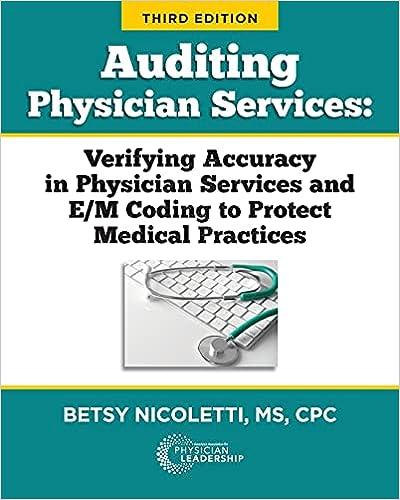Question
Replacing Labor with Automation Jack McGuire has been with Bulk Productions Group (BPG) for 14 years. BPG produces a variety of custom livestock feeds used
Replacing Labor with Automation
Jack McGuire has been with Bulk Productions Group (BPG) for 14 years. BPG produces a variety of custom livestock feeds used in the agricultural industry. He was recently promoted to plant controller at BPG's Midwest facility located in Ithaca, Michigan. During his first week in the Ithaca plant, he began to analyze the cost efficiencies of the current level of direct labor and automation costs at BPG's production site.
McGuire decides to start slow with a project testing the increased automation of their horse feed line. Below are the projected cost of the expansion in automation, given a 5 year useful life of the robotic equipment:
Direct Cost of Automation
Purchase price of new robotic equipment $1,450,000
Sales tax on equipment $87,000
Shipping cost of equipment $63,000
Equipment installation $175,000
Software $98,000
Initial system and equipment testing $25,000
Equipment scrap value after five years $70,000
Annual Warranty Service Contract $21,000
Other information:
1) The robotics proposal will eliminate one plant supervisor position with a salary of $98,000 per year.
2) Two machine maintenance workers will need to be hired at $41,000 each.
3) The automation and related electronics will increase energy usage by $126,000 per year.
4) The software will create an expected savings of $210,000 per year due to a reduction in inventory spoilage.
5) Automation efficiencies will create a one-time $150,000 cost reduction in BPG's inventory stored in their warehouse.
6) Automation will replace 25,000 labor hours costing $16 per hour.
7) BPG's International Home Office in Cedar Rapids, Iowa expects a 16% return on any new investments in production.
Required:
1) Ignoring present value concepts, what are the annual net cost savings if BPG further automates their production for horse feed?
2) Create a table showing the total initial cash flows for the investment in equipment, as well as all changes in cash flows for years one through five.
3) Summarize the net present value of all cost, comparing the cost of expanding automation to the cost of 25,000 labor hours. Given the net present value of the two alternatives, should BPG expand automation to the horse feed operation? Discuss your results. This discussion is well beyond just the numberswhat do these results mean? How will accepting or rejecting this project affect the company's future (discuss all aspects of the change, not just cost)?
4) How are your results affected if BPG only requires a 12% return on any new investments in production?
Step by Step Solution
There are 3 Steps involved in it
Step: 1

Get Instant Access to Expert-Tailored Solutions
See step-by-step solutions with expert insights and AI powered tools for academic success
Step: 2

Step: 3

Ace Your Homework with AI
Get the answers you need in no time with our AI-driven, step-by-step assistance
Get Started


